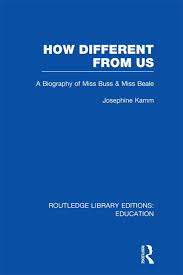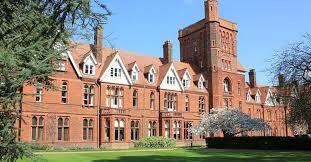Over the past few days, I’ve been reading Josephine Kamm’s 1959 biography of the renowned Victorian educators Miss (Frances Mary) Buss and Miss (Dorothea) Beale, ‘How Different From Us’. The subject matter of the book has some relevance to me personally: I will soon be moving to work at one of the schools founded by Miss Buss, and I want to get to know the life of the founder (and the school’s first headmistress) before I arrive. But I’ve also enjoyed reading a number of biographies of other Victorian educators in the past (last Christmas I read about the life of the Victorian scholar Mark Pattison and wrote about the experience of doing so here, and I’ve read a fair bit too about the life of John Henry Newman), so Kamm’s biography isn’t wholly unfamiliar territory for me.
I wanted to jot down a few thoughts here about what I’ve taken from the biography. I’ve learnt quite a bit about the history of Victorian education from the book, certainly, but I’ve been most interested, I think, by some of the things I’ve learnt about the characters and experiences of Miss Buss and Miss Beale as individuals – and it’s these that I’m going to focus on in this post.
Frances Mary Buss blazed a trail in women’s education in the mid-19th century. Her first school began with just a handful of pupils in 1850 and was staffed by, among others, members of her own family. Buss had been born into a middle class family and perceived a need to provide girls of her own sort of background with an education to match in quality that which their brothers could expect to receive. This meant study of the full range of academic subjects, from Maths and Science to Latin and Greek. It also meant confronting head-on a range of unpropitious entrenched stereotypes about girls and women, their aptitudes and interests. Buss, like Beale (who also founded her own school), was adamant that girls could – and should strive to – reach the same standards as boys in their studies.
Being an educational trailblazer wasn’t – and, no doubt, still isn’t – easy. In spite of her successes as a pioneer of women’s education (and there were many – her schools thrived and changed the landscape of Victorian education), as an individual Buss faced countless challenges and difficulties. Part of this can be put down to the fact that she was a fantastically busy and active individual; part of it was the nature of the job she was doing – and it was an increasingly demanding job; and part of it no doubt comes down to the particular psychological pressures she faced, both in relation to her own life, and from outsiders.

What comes across clearly from Kamm’s biography is that both Buss and Beale were formidably strong, determined and inspiring figures, with a great deal of conviction about their educational missions. But they are also fully human figures – vulnerable to self-doubt and worry, certainly, and subject to the full range of human feelings – while being also modest and kind, public figures who managed to combine feeling for others and an understanding of what their schools, and pupils, needed, with straightforward and down-to-earth common-sense.
A good example of the latter qualities in action comes in a description of Beale’s scornful attitude toward the sort of teacher who ‘feeds the moral nature of a child from her own life’, making the child into a ‘parasite, unable to live apart from her’. Buss herself aimed to have an energising impact on her pupils, but she was entirely opposed to ‘hero-worship’ (something which she thought might happen naturally enough in children, but which a good teacher should know how to guard against). Buss offered the following common sense advice to a young teacher who was struggling to deal with being idolised by a pupil: ‘the quickest way to stop that sort of behaviour’, she counselled, ‘is to let the girls get to know you. Once they see you as you really are, they will stop idolising you’. This remains, I suspect, wise advice which can apply equally to the education of boys.
One of the most difficult periods in Frances Mary Buss’s career came in the early 1870s, when – as headmistress – she found herself wrestling to maintain responsibility and control over her school. The challenge to her freedom to act as she wished as headmistress came from certain school governors, who wanted to have some say in the school’s day-to-day running. The interest of this episode, for me, lies in the way Buss received and benefitted from the advice of two important friends concerning it – and the way their advice differed.
One friend, Annie Ridley, warned her that any ‘impetuous’ behaviour toward these governors could damage her position – not just as headmistress, but as an advocate for girls’ education across the country more generally. She advised Frances Mary ‘never to give way to anger or indignation except before one of her more understanding friends’. She assured her that all of her own instincts ‘were to dash headlong [with Buss] into open warfare against the Chairman [of governors], yet she nevertheless maintained that the good of the school should come first and that ‘it is greater in you…to rise above all that’.
Another friend, Emily Davies (who, with Buss’s support, founded Girton College, Cambridge), was altogether less conciliatory than this. ‘In a case like this [i.e. Buss’s antipathy towards the chair of governors]’, she wrote, ‘I feel that plain speaking, painful as it must be, and trying to do justice to the other side is the best help one can give’. Davies knew that these words would ruffle feathers: ‘I know what I have said must hurt you. You would not be human if it did not’. The result of this advice, in Kamm’s analysis, was nonetheless positive: Buss now demonstrated ‘caution, if not reserve’ with the governors.

There are several interesting things about these two pieces of advice, I think. First, they highlight clearly the importance of a supportive and gentle tone when giving advice: Emily Davies’ heart may well be in the right place, and her advice may well end up being acted upon, but she manages also to create distress in giving it, in a way that the more sympathetic and careful Annie Ridley does not. Second, both pieces of advice highlight the importance of, well, advice. Buss, evidently, did not try to react to the challenging features of her work in a psychological vacuum: she relied too on conversations with her friends and confidantes. Finally, I think, there is something moving as well as interesting about the tenderness and kindness of Annie Ridley’s approach: she expresses solidarity with Frances Mary’s emotional outlook, while also managing to zone out and look at the situation within a broader context when delivering her advice. She achieves a combination of tactfulness and perspective, then – an example, perhaps, of the best kind of friendly advice in microcosm.
Josephine Kamm’s biography was published in the 1950s, and it doesn’t handle the gender dimension of its subjects’ careers with the kind of careful attention that a contemporary writer would hope to give it today. A modern biographer would have a good deal more to say than Kamm does, I think, about Buss’s feeling that ‘it tears me apart to have to be always asserting myself’ (in the context of her wrangling with the governors). Self-assertion, Buss confides to Annie Ridley, is something she feels she must do if she is to enjoy ‘a certain amount of freedom of action’.
Yet her discomfort with self-assertion, a contemporary observer might feel, must have had a lot to do with the presumably awkward business of adopting an opinionated, outspoken or demanding stance in interaction with powerful Victorian men (such as the governors of Frances Mary’s school were). The experience of doing just this, she herself reports, brought her in mind of the ‘Mystery of Pain’ and made her sob herself to sleep like a child.
This, we might say, was just one of the psychological difficulties of being a woman with a public role in a man’s world, a world where assertiveness and femininity did not – and were not exactly expected to – belong together. Yet, in looking over the career of Frances Mary Buss for the first time, I find myself feeling that she somehow managed to square this particular circle – no doubt with the help and sage advice of friends like Annie Ridley along the way, but also because of the sheer extent of her personal commitment to public educational initiatives.
She was on the Council of half a dozen training organisations, including the Cheltenham Ladies’ College (Miss Beale’s school), the College of Preceptors, the Women’s branch of Swanley Horticultural College and the Cambridge Training College for Teachers (which she helped to found). She was also a governor of UCL and of the London School of Medicine, and a number of other girls’ schools, as well as being an associate of a number of organisations concerned with girls’ education more generally. With this incredible range of public commitments, it seems unreasonable to doubt her capacity to believe in herself as an assertive public figure. It is also easy to see why so many people were so in awe of her.*
*I have taken references from Josephine Kamm’s biography, pages 76, 134-5, 142-3, 176, 185.


Interesting post. Thanks Gavin.
LikeLike
thanks for the book recommendation.
I’m currently researching the life of another educational pioneer – Elsie Day – who was a founding member of the Association of Headmistresses, and the first Head Mistress of the Grey Coat Hospital, entrusted in 1874 (at just 25) with managing the change from a charity boarding school for girls and boys, to a girls’ day school in line with the new Education Act for charity schools. She obviously drew strength from Miss Buss and Miss Beale, as she cites their agreement with her ideas about educating girls in her letters to the school governors (she carried the point)
LikeLike
Thank you for sharing this. Elsie Day sounds like another very interesting figure! FMB an inspiring and very human figure whom it was a pleasure to read about when I wrote this short piece!
LikeLike
Elsie Day is my heroine! I’ve since discovered that she was a close friend of Miss Buss, and used to meet regularly to talk about their schools and pray together. She wrote an account of this friendship and Miss Buss’ great talent as an educator in a tribute after her death. I’m on a mission to explore her work in raising The Grey Coat Hospital to a school that really educated girls – she should have recognition for her part in women’s education reform.
LikeLiked by 1 person
Very interesting especially (to me) on the danger of hero-worshipping teachers. I had two contrasting ones more than 50 years ago who had a huge and lasting impact. One was De La Salle, Brother Maurice Kirk whom I describe as “one of the last figures in a line of educators that began with Thomas Arnold headmaster of Rugby School from 1828 to 1841”. I have written about him (and Fr Michael Sweetman SJ) here: “The Reason Why: Brother Maurice Kirk and I [Part 1]”
https://irishsalem.blogspot.com/2019/09/the-reason-why-brother-maurice-kirk-and.html
I don’t think either actually ENCOURAGED hero-worship. but many years later a former fellow student described Brother Maurice to me as “an intellectual bully”. Mind you the same might well be said of Matthew Arnold!
LikeLike
Thank you for the comments. Yes, hero worship can be inspired subtly, I suppose. But the best teachers don’t try to be heroes, and aren’t seen as heroes, I think!
LikeLike